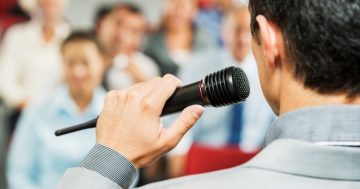Bruce Kasanoff* says that in a world where big data are proclaimed the answer to everything, there is still a crucial place for properly used human intuition.
 Gerd Gigerenzer, a Director at the Max Planck Institute for Human Development, says intuition is not so much about “knowing” the right answer.
Gerd Gigerenzer, a Director at the Max Planck Institute for Human Development, says intuition is not so much about “knowing” the right answer.
He believes it is about instinctively understanding what information is unimportant and can thus be discarded.
Dr Gigerenzer, author of the book, Gut Feelings: The Intelligence of the Unconscious, says that he is both intuitive and rational.
“In my scientific work, I have hunches. I can’t explain always why I think a certain path is the right way, but I need to trust it and go ahead,” he says.
“I also have the ability to check these hunches and find out what they are about.
“That’s the science part. In private life, I rely on instinct.
“For instance, when I first met my wife, I didn’t do computations. Nor did she.”
I’m telling you this because a reader, Joy Boleda posed a question that stopped me in my tracks:
“What about intuition? It has never been titled as a form of intelligence, but would you think that someone who has great intuition in things has more intelligence?”
My gut instinct is to say yes, especially when we are talking about people who are already intellectually curious.
If all you do is sit in a chair and trust your intuition, you are not exercising much intelligence.
If you take a dive into a subject and study numerous possibilities, you are exercising intelligence when your gut instinct tells you what is — and isn’t — important.
In some respects, intuition could be thought of as a clear understanding of collective intelligence.
Most web sites are today organised in an intuitive way, which means they are easy for most people to understand and navigate.
This approach evolved after many years of chaos online, as a common wisdom emerged over what information was superfluous and what was essential.
You might say I’m a believer in the power of disciplined intuition.
Do your legwork, use your brain, share logical arguments, and I’ll trust and respect your intuitive powers.
If you merely sit in your chair and ask me to trust your intuition, I’ll quickly be out the door without saying goodbye.
I say this from personal experience; the more research I do, the better my intuition works.
Sometimes, a corporate mandate, or group-think, or your desire to produce a certain outcome can cause your rational mind to go in the wrong direction.
At times like these, it is intuition that holds the power to save you.
That ‘bad feeling’ gnawing away at you is your intuition telling you that no matter how badly you might wish to talk yourself into this direction, it is the wrong way.
Intuition is often behind those eureka moments that underlie most great discoveries and innovations.
Wharton Professor, Adam Grant says writers and physicists report that 20 per cent of their most important ideas happen during mind wandering.
“Time set aside to daydream is an essential part of a creative day,” Professor Grant says.
Is this how your organisation works? Does it carve out time for people to be creative and to explore? In many cases, the answer is no.
There are limits to what discipline and data can produce. Our increasingly data-driven world has severe limitations.
Big data does some things very well, but it is a long way from a magic solution to, well, anything.
Yet we are increasingly surrounded by leaders and organisations that want to make every decision based on data.
Big data can be just as biased as your stubborn old uncle who thinks everyone who disagrees with him is an idiot.
Researchers have found algorithmic bias exists even when there is no discrimination intention in the developer of the algorithm.
This does not mean that the programmers were biased; it could also be that the data sources contained certain forms of bias.
The antidote to such flaws and weaknesses is not more data.
Instead, we need to raise the amount of respect given to the very human skill of intuition.
Not blind hunches, but arriving with confidence at an answer without being able to explain how you got to that answer.
In the big data era, being unable to explain your logic is a huge liability, and yet this is exactly what happens with expert intuition.
In the years ahead, artificial intelligence and automation are going to kill millions of jobs.
You’re not going to be able to protect your job simply by acting more like a computer because every computer will be able to out-computer you.
Instead, you need to foster uniquely human skills, such as intuition.
The same is true for your organisation. Human qualities will become more important in the years ahead, not less.
In far too many cases, the facts tell you to do one thing, but your intuition screams the opposite.
When that happens to me, I never ignore those screams.
* Bruce Kasanoff is a ghostwriter for entrepreneurs. He is the author of How to Grow Your Career by Helping Others. He can be contacted at kasanoff.com
This article first appeared at Forbes.com.











